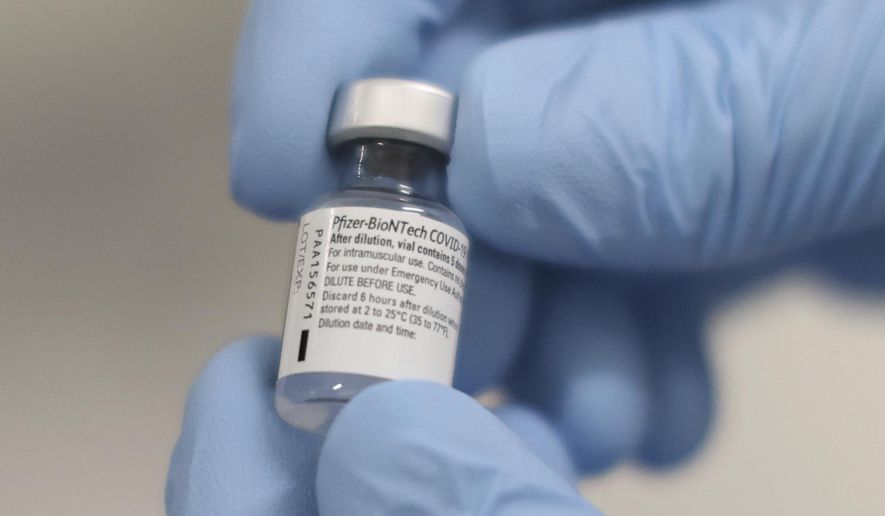The Food and Drug Administration approved Pfizer’s coronavirus vaccine for emergency use late Friday, launching an historic campaign to inoculate millions of Americans against a disease that’s upended normal life, pummeled the economy and killed nearly 300,000 in the U.S.
Regulators authorized the two-dose vaccine for use in persons 16 or older after an advisory panel of outside experts endorsed the vaccine late Thursday and the White House heaped immense pressure on the FDA to get it done before the weekend.
President Trump called it “one of the greatest scientific achievements in history.”
“Today our nation has achieved a medical miracle. We have delivered a safe and effective vaccine in just nine months,” Mr. Trump said in a three-minute video he tweeted after the approval. “A vaccine will vanquish the virus and return life back to normal.”
Now the hard work begins.
Mr. Trump’s “Operation Warp Speed” is expected to load nearly 3 million vials onto FedEx and UPS planes within 24 hours of the FDA’s decision. States told the federal government where the shipments should go.
The federal operation will hold back nearly 3 million additional doses, so the first recipients can be assured their booster shot 21 days later. It is also reserving 500,000 doses in case of early mishaps.
States are expected to begin inoculating health workers and residents of long-term care facilities within a day of receiving their share of doses, though governors will have the final say over who’s first in line.
The administration hopes to get initial shots into 20 million people before the end of the year.
Vaccination is considered the world’s best chance at reining in the virus, so long as enough people take up the vaccine to induce the type of widespread immunity that leaves little human tinder for the virus to burn. Immunizing every American who wants the vaccine will take months, however, stretching into late spring or early summer.
In the meantime, the country is entering a daunting period.
The coronavirus killed roughly 3,000 Americans on successive days and doctors and nurses are worn down by the flood of patients. Over 107,000 patients have been admitted for COVID-19 in hospitals across the country.
“Despite this momentous breakthrough, we must not let our guards down,” Sen. Mark Warner, Virginia Democrat, said in a statement cheering the news. “As health officials boost vaccine production for public distribution, we must continue to follow public health guidance on frequent handwashing, mask wearing, and social distancing. While I welcome this good news, the best way to keep our communities safe and slow the spread is by following these necessary steps.”
New York Gov. Andrew Cuomo, a Democrat, said indoor dining in New York City will shut down again on Monday as he tries to stave off another wave of the virus and stabilize hospitalization rates. Eateries are likely to cry foul, saying they’re on the brink of collapse and 70% of New York cases have been traced to household gatherings, anyway.
Pfizer, which developed the messenger-RNA shots with German company BioNTech, requested emergency approval on Nov. 20 after data showed its vaccine was 95% effective against COVID-19. It beat several other vaccine candidates to the punch, though Moderna is right behind it with shots that also use mRNA.
Canada recently approved the Pfizer vaccine and the U.K. started injecting it into people days ago, heaping pressure on U.S. regulators.
Mr. Trump scolded the FDA even as it put the finishing touches on its authorization. He said the agency is a “big, old, slow turtle” when it appeared the agency would act Saturday instead of finishing by Friday evening.
“Get the dam [sic] vaccines out NOW, Dr. Hahn @SteveFDA. Stop playing games and start saving lives!!!” he tweeted Friday.
Mr. Trump struck an upbeat tone once authorization was in hand, thanking the “brilliant scientists” who made the breakthrough possible and extolling the “gold standard” review at the FDA.
He said experts at the agency “meticulously” studied the vaccines after human trials that enrolled tens of thousands of people.
The FDA set a high bar for COVID-19 vaccines to earn emergency approval, demanding standards that approach a full biologics license. Pfizer said it plans to file for full licensure by April.
Pfizer did not take any money from the Trump administration in developing its vaccine, though it entered a pre-purchase agreement with the U.S. to provide 100 million doses with the option to provide 500 million more.
Other companies, including Moderna, accepted federal help and even worked alongside government scientists to create their vaccines. The administration said it procured an additional 100 million doses from Moderna on Friday, for 200 million total.
Johnson & Johnson is developing a promising single-dose shot that could be approved for emergency use by January of February.
A partnership between Sanofi and GlaxoSmithKline said the launch of its vaccine likely won’t occur until late 2021 after clinical trials showed an inadequate response in older people.
AstraZeneca, meanwhile, said it will work with Russian scientists to see if its vaccine can be combined with Moscow’s Sputnik V vaccine to increase efficacy.
• Tom Howell Jr. can be reached at thowell@washingtontimes.com.




Please read our comment policy before commenting.